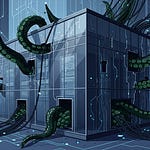Ralph welcomes acclaimed journalist, Andrew Cockburn, who argues that the more we spend on the armed forces the weaker we actually get. And energy security expert Joel N. Gordes explains how best we can safeguard our vulnerable power grid from a cyber attack.
Andrew Cockburn is a journalist, who has been covering defense and national security affairs since the height of the last Cold War and has published numerous books on these topics. Now, he is the Washington editor of Harper’s Magazine and the author, most recently, of Kill Chain: The Rise of the High-Tech Assassins. His latest article in Harper’s is entitled “The Military Industrial Virus: How Bloated Defense Budgets Gut Our Armed Forces.”
“People tend to say – and it always seems obvious – we have these bloated defense budgets because we have these foreign wars… I think people get it the wrong way around. I think we have these foreign wars because of the bloated defense budgets. They (the wars) are there to justify the budget, not the other way around.”
Andrew Cockburn, author of “The Military Industrial Virus: How Bloated Defense Budgets Gut Our Armed Forces.”
Joel N. Gordes is military combat veteran, who flew over 130 combat missions over Vietnam, Laos and Cambodia. formerly President of Environmental Energy Solutions and the Center for Energy Security Solutions, both energy consultancies involved in multidisciplinary aspects of energy and environment, especially as it relates to security.
“We need microgrids as hopefully a panacea to the problem (of cyber-security). A microgrid is not the same as a ‘smart’ grid. A smart grid has made extensive use of ‘smart’ technology. So, they’re often confused. A microgrid has certain characteristics that separate it from the main grid. It has its own fuel supply. It has its own physical security. It is less dependent on external supply chains. And in general, it allows you to cut off from the main grid.”
Joel N. Gordes, cyber security expert.














